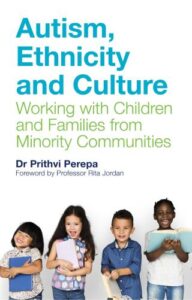Family Engagement and Child Care
This topical guide will introduce you to important books, videos, and information resources available from the EI Clearinghouse and other sources. Contact us via online form or by phone (1-877-275-3227) to request a resource listed below (or ask your local public librarian). Note that some videos may be viewed online, and journal titles will take you to the publisher’s homepage.
Table of Contents

EIC Resources
No resources have been added to this section yet. However, new resources are added frequently!Books

This book provides a comprehensive overview of autism and minority ethnic communities with guidance on how to best support children and young people from these communities.
This unique resource offers practical ideas and activities for developing partnerships with families that can be implemented for instant use by classroom teachers.
his book emphasizes the importance of family-professional relationships when working with young children. This book gives examples on how to work with parents and bring them in as a part of the collaborative team, noting that the child benefits the most when families and professionals work together effectively.
This book is a thoughtful and practical resource for early childhood providers seeking to create positive relationships with the parents of young children.
This book links theory, recommended practices, and research to the daily practice of providing services to young children and their families, with a focus on family-centered services.
This book addresses the realities of working with families and provides effective steps to help early childhood professionals initiate and maintain efforts as they build mutually respectful relationships in their program.
This book presents research-based best practices for serving families of children with special needs from birth to age 6. It offers indispensable tools for assessing families, identifying and capitalizing on their strengths, providing information, support, and coaching, collaborating with parents and teachers to address children’s functional needs in the context of everyday routines, and coordinating care.
Videos and Media
Multi-Media training kit
Designed for use in a variety of professional development settings, this training library is an easy-to-use, comprehensive training curriculum for individuals working with young children who have disabilities, birth-five, and their families.
Presents six stories that demonstrate recommended practices, as a therapist or early childhood specialist works collaboratively with a family to achieve meaningful goals for their child in everyday activities, and places. Facilitator’s guide by Larry Edelman.
Organizations
No resources have been added to this section yet. However, new resources are added frequently!Articles
Researchers have identified a number of factors that are associated with variations in parents’ involvement in early childhood intervention. This study added to that knowledge base by demonstrating that where early intervention services are provided is a factor that influences the level of parent involvement in services. It also suggests that using capacity-building, family-centered practices as part of home-based interventions will likely have value added effects on parenting confidence and competence.
This review provides an overview of an important aspect of early childhood home visiting research: understanding how parents are involved in program services and activities. Factors that influence parent involvement are noted, including parent characteristics, qualities of the home visitor, and program features.
This study explored the perceptions of practitioners of parental involvement in early intervention programs for children with autism. The findings supported other related research on the positive effects of parental involvement and engagement in early intervention services. It also suggests the need for early intervention staff to encourage involvement of families in programming and service provision to improve child outcomes and results.
Web Resources
This list provides resources to help providers discuss difficult topics with parents. Web articles, books, journal articles, and organizations are listed.
Collaborative problem-solving will require that parents, educators, specialists, and administrators work together to determine appropriate resources and supports as well as specific information-sharing practices that facilitate parental engagement.
This paper provided an extensive review of the research on family engagement, clearly supporting the importance of strong partnerships between families and early childhood education programs.
The Global Family Research Project is an independent, entrepreneurial nonprofit organization that supports all families and communities in helping children find success in and out of school.
The PFCE Framework was developed in partnership with programs, families, experts, and the National Center on Parent, Family, and Community Engagement. It is a research-based approach to program change that shows how an agency can work together as a whole—across systems and service areas— to promote parent and family engagement and children’s learning and development.

